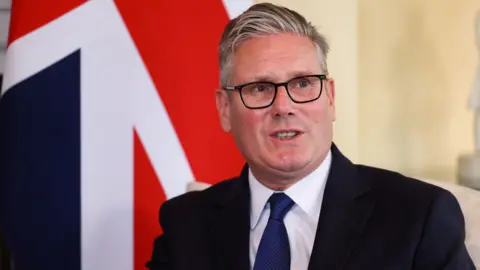In a recent announcement that reverberates across international headlines, Sir Keir Starmer, the leader of the UK Labour Party and a prominent figure in British politics, condemned Israel’s ambitious plans aimed at taking control of Gaza City. Starmer characterized the strategy as “wrong” and warned that such actions would likely escalate the already intense violence in the region. His criticisms came shortly after the Israeli Prime Minister Benjamin Netanyahu’s security cabinet approved a proposition, which emphasizes increased military action in Gaza.
Starmer’s assertion reflects a broader concern about the humanitarian situation in Gaza and its implications for regional stability. The approval of the Israeli military operation specifically targets Gaza City, the largest urban area within the Gaza Strip, which is enduring substantial population pressures and infrastructural strain as a result of ongoing military conflicts. This move by the Israeli government has sparked serious apprehensions among various stakeholders, including military leaders and families of hostages thought to be held by Hamas, who fear that these operations could jeopardize the safety of the twenty captives believed to still be alive.
In articulating his stance, Starmer stressed the urgency for Israel to reverse its decision to escalate its military offensive: “This action will do nothing to bring an end to this conflict or to help secure the release of the hostages. It will only bring more bloodshed,” he stated. The dire humanitarian crisis, which worsens daily, has led to the suffering of many innocent civilians caught in the crossfire, with reports indicating horrendous conditions for hostages taken by Hamas. Starmer’s call for a ceasefire stands at the forefront of his argument, along with a proposal for a humanitarian aid surge and a negotiated resolution that excludes Hamas from any future governance of Gaza.
The British Liberal Democrats, led by Sir Ed Davey, echoed Starmer’s sentiments, going a step further to label Israel’s current military agenda as “utterly abhorrent.” Davey articulated his views by stating that the goal appears directed towards ethnic cleansing and insisted on the necessity for immediate action from the UK government. He urged for stricter measures including ceasing arms exportation to Israel and placing sanctions on Netanyahu’s administration.
Simultaneously, crucial dialogues are underway at the highest political levels between the UK and the United States. British Foreign Secretary David Lammy is scheduled to meet U.S. Vice President JD Vance at Chevening House, where bilateral discussions on various topics pertinent to US-UK relations will take place. This meeting, although a private affair marked by family visits, represents a strategic moment for both countries to address the unfolding crisis in Gaza. The UK recently proposed recognizing a Palestinian state contingent on Israel taking significant steps to alleviate the humanitarian crisis and commit to a two-state solution, a move that has faced backlash from Israel and is perceived as straining UK-US relations.
Critics of Israel’s military action, including the United Nations, have raised alarms over the potential for catastrophic consequences that a complete military takeover could entail, particularly for the Palestinian population and Israeli hostages currently situated in Gaza. Israel’s military now governs around three-quarters of Gaza, a region with a population exceeding 2 million, a fact contributing to the volatility and complexity of humanitarian efforts in the area.
In response to the escalating tensions, Netanyahu’s office released a detailed five-point plan aimed at “defeating Hamas,” with objectives that include disarming the militant group, returning hostages, and establishing new civilian governance devoid of Hamas or the Palestinian Authority’s influence. As the world watches these developments closely, it is evident that reaching a stable and peaceful resolution requires de-escalation and a commitment to humanitarian concerns from all involved parties.
The overarching sentiment expressed by various political leaders and organizations underscores the critical need for dialogue, humanitarian aid, and a decisive shift towards negotiations that prioritize human rights and peace over military strategies.











